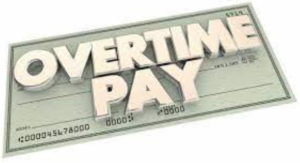Overtime Pay
Overtime Pay

An employer who requires or permits an employee to work overtime is generally required to pay the employee premium pay for such overtime work. Employees covered by the Fair Labor Standards Act (FLSA) must receive overtime pay for hours worked in excess of 40 in a workweek of at least one and one-half times their regular rates of pay.
The FLSA does not require overtime pay for work on Saturdays, Sundays, holidays, or regular days of rest, unless overtime hours are worked on such days.
The FLSA, with some exceptions, requires bonus payments to be included as part of an employee’s regular rate of pay in computing overtime.
Extra pay for working weekends or nights is a matter of agreement between the employer and the employee (or the employee’s representative). The FLSA does not require extra pay for weekend or night work or double time pay. It should be noted that there are exceptions to overtime pay for some industries. This is especially true for Truck Drivers and those in the Trucking industry.
It is illegal to fire, fail to promote or otherwise discriminate against an employee who complains or questions his / her Overtime pay.
When Overtime Must Be Paid
If you have worked over 40 hours in one week, your employer is required to pay you for your overtime hours on your regular payday. However, exceptions can be made in certain circumstances. For example, if you worked additional hours during the last night of a pay period and your boss turned in your hours before finding out that you were working overtime, he or she may get an extension.
Damages in Overtime Case
If your employer is not paying you the overtime that you deserve, you don’t have to stand for that kind of treatment. You can file a legal claim and obtain the compensation you deserve. Here are types of damages you may be entitled to.
- Unpaid Wages: First and foremost, you may receive compensation for the wages your employer never paid you. If you win your claim, a judge will order your employer to pay you what you are owed, including overtime pay.
- Interest: If you file a claim for unpaid overtime, you may also be entitled to receive interest. The laws in your state will determine the interest rate you will receive for your unpaid wages.
- Penalties: In some states, employers who fail to pay workers the overtime they deserve must pay a penalty.
- Legal Fees: In order to improve your chance of winning an overtime pay claim, you should have an experienced lawyer on your side. If you win your case, your employer will be required to pay any legal fees you acquired.
Hiring a Lawyer
If you have not been paid the overtime that is owed to you, your next step is to speak to a skilled employment lawyer. He or she can assess your case and determine if you have a good chance of winning your claim. If you have any documents that pertain to your case, such as pay stubs, you should bring them with you to the meeting.
If a lawyer has determined that you have a strong case, he or she will assist you in filing a lawsuit against your employer. Your lawyer will help you gather the evidence you need to prove your case and protect your legal rights.
Many employment lawyers work on a contingency basis. This means that you do not have to worry about owing your lawyer any money upfront.

EMAIL US
Client Review
“Words can’t express enough how grateful and extremely happy I am to have had Mr Roger Davie represent the most tragic experience in my life. Not only is he and his case manager Deborah Morales professional, but they are also a hard working determined team, who sincerely care! I am truly thankful!!”
Angela Serna

